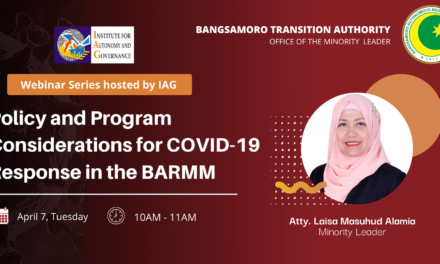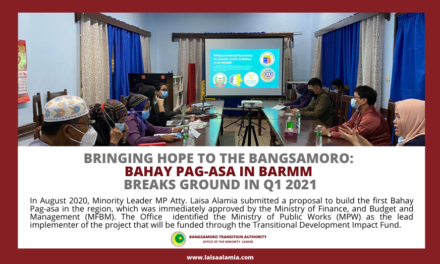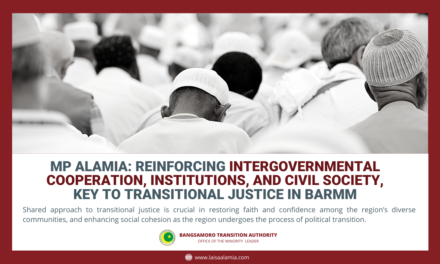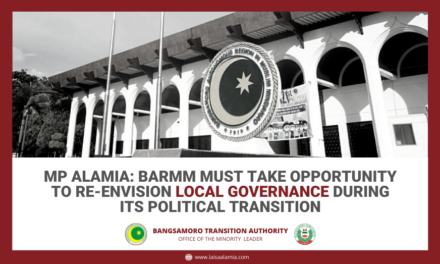“Peace and development in the Bangsamoro is a huge, complex undertaking which would need the participation and commitment of different players, and effective collaborations need to be forged among different actors such as the youth, civil society, and the private sector,” MP. Atty. Laisa Masuhud Alamia said in the webinar series entitled Kamalayan: A Conversation on the BARMM Transition.
MP Alamia was a resource speaker for the webinar held yesterday, May 26, together with panel discussants SK Federation President Hon. Cary John Pioc, Silsilah Dialogue Movement founder Fr. Sebastian D’Ambra, and Gagandilan Mindanao Women Inc. founder Alexandria Abdullah.
The said event aims to raise awareness and discussion of the Bangsamoro transition among Zamboangueños, and is organized by the Ateneo Center for Leadership and Governance and the Social Development Office, in partnership with the Institute of Autonomy and Governance. It hopes to “encourage participation and dialogue among the youth sector, the academic sector, and the civil society organization on the transition of the BARMM.”
Legislating the future
Tracing the Bangsamoro struggle for self-determination’s history, MP Alamia linked the Bangsamoro people’s history of marginalization, dispossession, and discrimination to the region’s present conditions, with the Bangsamoro Organic Law establishing legal recognitions for the collective identity of the Bangsamoro people and the foundation for stronger autonomy of the Bangsamoro regional government.
The Bangsamoro Parliament is tasked with legislation and part of its mandate is to draft priority legislations that will serve as the framework for governance in the region in the following years. “To date,” MP Alamia said, “the Bangsamoro parliament has approved both the administrative code and civil service code while drafts of Election Code, Education Code and Revenue Code are still pending approval.”
“While the Local Government Code is not one of the ones enumerated under the priority legislations of the BTA, the enactment of such is embodied in the BOL and a bill for a Bangsamoro local government code has already been filed in the parliament,” she added. It is also “the duty of the BTA to enact a law that recognizes, protects, promotes, and preserves the rights of the indigenous peoples in the Bangsamoro Autonomous Region.”
The parliament has also adopted the Bangsamoro Development Plan 2020-2022 which details the overall thrust and direction of the BARMM over a 3-year transition period.
Challenges and commitments
While the regional government has made some headway during the transition, it still faces a number of challenges such as human capital shortfalls and fiscal challenges, notwithstanding the ongoing Covid-19 pandemic which has caused a “shift of focus in terms of resources and attention” as it “widens inequalities in societies, and reinforces corruption, patronage, and impunity.”
MP Alamia emphasized the importance of coordination between the government and other sectors such as the youth, civil society, and the private sector in order to address existing challenges in the region. She notes that these sectors have been consistent in actively engaging in the peace process, and their contribution to governance in the region has been invaluable in pushing the Bangsamoro forward.
“Peace and development in BARMM means improved security for Mindanao, thus motivating more economic activities and harnessing the full economic potentials of Mindanao regions towards overall Philippine growth and inclusive development,” MP Alamia said as she noted that “the sustained policies for peace and the continuing and committed investments in social, physical, economic, and cultural infrastructure will likely correct socioeconomic disparities in the region and the rest of Mindanao, raise human development, and reduce multidimensional poverty.”








